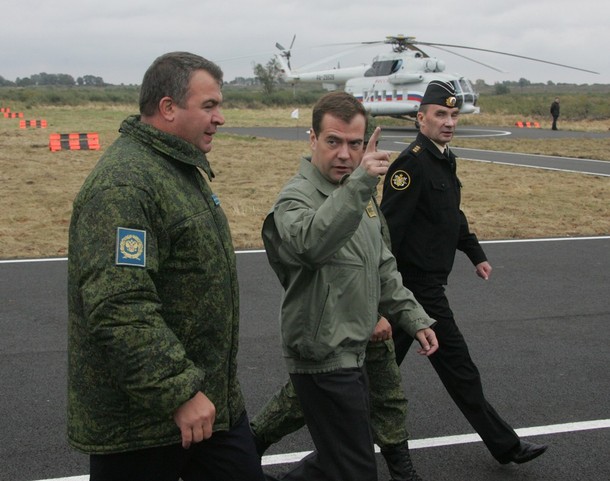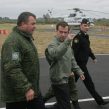
Medvedev Chastises the Russian Defense Industry
Publication: Eurasia Daily Monitor Volume: 6 Issue: 199
By:

Last month, the Russian President Dmitry Medvedev visited the large-scale military exercises Zapad 2009 held in Russia’s Baltic enclave of Kaliningrad and in Belarus. In Kaliningrad, Medvedev observed a landing by marines with the support of naval battleships and airpower. In Belarus, along with President Alyaksandr Lukashenka he observed armor and airborne formations of both national armies, supported by airpower repelling an “aggression,” apparently by NATO forces advancing from the West. In Kaliningrad, Medvedev promised to “rebuild a strong Russian navy in 10 years” (RIA-Novosti, September 28). In Belarus, Medvedev hailed Zapad 2009 as a “wonderful event” that will help build “a new compact and modern armed force,” while coordinating defense “in repelling aggression with our allies.” It was reported that Zapad 2009 was the biggest military exercise in Belarus since 1984 when it was part of the USSR. Some 12,500 solders, 40 aircraft and 200 pieces of heavy military equipment were reported to have been deployed in Belarus for the exercise (Interfax, Kommersant, September 29).
The comparison of Zapad 2009 with exercises held in 1984 was valid. The troops deployed in Zapad 2009 used basically the same Cold War era armaments, equipment and aircraft. There was one new Su-34 bomber from the Lipetsk Air Force training center, and one Ka-52 and several Mi-28H attack helicopters from the Torzhok training center. Apparently, regular units do not have these modernized weapons battle ready, though the Su-34, Mi-28 and Ka-52 are not particularly new –originally designed and developed in the 1980’s. Electronic command and control equipment was tested during Zapad 2009, but it also apparently was not exceptionally new (VPK, October 14).
This week, it was reported that the First Deputy Defense Minister and Chief of the General Staff, Army-General Nikolai Makarov and other top military commanders used Zapad 2009 to complain to Medvedev that the Russian defense industry has failed to supply the armed forces with modern weapons and that Russia may be forced to buy them abroad (Kommersant, October 27). Medvedev ordered a special meeting this week at a missile-building factory near Moscow with ministers and defense industry chiefs to communicate his disgust with the state of arms production and call for radical improvements. He announced that the decision to hold the meeting was indeed taken during Zapad 2009 “because of serious charges raised there.” Medvedev accused the Russian defense industry of squandering massive budget allocations disbursed in recent years, while leaving the defense industry technologically backward. According to Medvedev, the quality of armaments for export and the ones procured by the defense ministry is lagging. Moreover, he accused the defense industry of grossly overpricing its produce, “so it makes less and less sense to buy it.” Research and development of new weapon systems drag on for decades, according to Medvedev, until they become obsolete while “money is spent to modernize hopelessly outdated equipment” (www.kremlin.ru, October 26). The Minister of Trade and Industry Victor Khristenko declared that the quality of defense produce is falling, while the defense ministry and foreign customers are filing more complaints (RIA Novosti, October 26).
Medvedev has announced plans to re-equip the armed forces with new weapons by 2012, but it does not seem to be happening. The Russian defense industry is in deep crisis and it is good that the president has publicly acknowledged the facts. But simply scolding an industry in which the government itself has a controlling stake will not result in change. The Russian defense industry has been able to continue to produce Soviet-era weapons using equipment, know-how and stockpiles of components left over from the Cold War. In some cases, modernized weapons like the Su-30 jet sold to India and other foreign buyers have been produced using Western avionics and other components. But the defense industry has utterly failed to produce weapons the Soviet inventory did not have – like modern intelligence-gathering drones. Another embarrassing public frustration is the Bulava sea-launched ballistic missile that has failed test after test. Sloppy workplace discipline, the growing lack of a qualified workforce, shortages of modern materials and components is plaguing the defense industry.
The defense ministry has recently promoted the idea of procuring Western-made weapons. Russia has procured Israeli drones and is discussing with France the possible purchase of a Mistral-class helicopter-and-troop-carrying warship (RIA Novosti, October 1). Russia, of course, wants foremost not off the shelf weapons, but the transfer of technology. In the past communist Russia did manage to buy Western technologies to modernize its military and use them against the West. In 1946 Moscow obtained British jet engines and with them built a vast fleet of MiG fighters that harassed the U.S. Air Force during the Korean War in 1950-1953.
It is not clear, if the West will insist that Moscow first change its anti-Western policies and stops the harassment of its neighbors such as Georgia and Ukraine before supplying it with advanced military technologies.
Recently, Medvedev has constantly lamented the lack of progress in his well publicized plans to modernize Russia, but little has changed as a result of his invectives. This week, at another meeting near Moscow with ministers and electronic producers, Medvedev was angry about the inability to build a 3G mobile telephone network in Moscow and the failure to make the GLONASS (Russian GPS) work properly (Interfax, October 28). There is nothing secret or forbidden in the transfer of 3G technology, but it still does not work in Russia. Even if the West is ready to help the Russian military rearm it is not clear that the corrupt and cumbersome Russian bureaucracy will manage the job.




